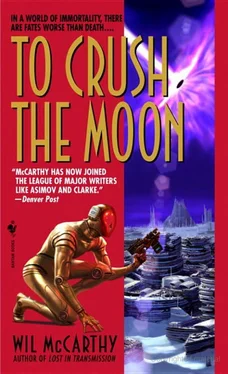Bruno had placed himself in police custody as well, albeit at the head; he was known to involve himself from time to time in legal matters, when the mysteries were sufficiently compelling and the stakes sufficiently high. Could a scientist-king do any less?
Women ran the worlds from the household level on up to the monarchy itself, keeping track of schedules and finances and subtle balances of mood that perhaps trumped all else. He supposed they had always run things, or nearly always, even in the ages of supposed male dominance. But was their universe fully constructed? Fully invented? Were there no discoveries to be made, nor evildoers to be caught and punished? If women consolidated and civilized, surely it fell to men to build and fight, to push the boundaries within which their women ruled.
“On the contrary, my old friend,” Bruno said to Captain Shiao, “our Fatalist adversaries have exactly what they want. They’ve decohered an uncertainty, nailing a message to the collective lintel of our civilization. And the message is death. Whether or not anyone has actually been expunged, they’ve succeeded in reminding us all that true death is still possible , even here. Thus, they have altered the context of future debate, and furthered the cause of their deathist allies in polite society.”
“No doubt you’re right, Sire,” Shiao said with utmost diplomacy, “but I would rather face an enemy who reminded me of death, than one who was actually capable of producing it.”
They all shared a laugh at that—except Shiao, who stood ramrod straight and seemed poised to leap into action at any moment. Indeed, Bruno would expect no less of him, for the universe required vigilant defenders for whom humor was a rare extravagance.
“They may still be capable,” Mursk said finally, studying the gloomy activity around him. They were standing in the Constabulary’s Intelligence Control Unit, twenty meters underground. All around them were workstations occupied by grave-faced men and women examining graphs or holographic images or lines of scrolling text, or else listening to focused audio streams no one else could hear. In fact, the most talented among them were doing all of these things at once.
“Possibly, sir,” Shiao allowed, “but how? Wherever antimatter or fissionable materials are stored there is always neutrino leakage. Suspects will occasionally try to shield their contraband behind opaque condensates, but the shadow stands out clearly in our nasen-beam searchlights, which run continuously. This also allows us to track the absorption spectrum of explosives and toxins and fusionable materials. Neubles of course store a tremendous energy which can be released if they’re broken, but fortunately they produce the sharpest echoes of all. So at least on the planets themselves, we know the locations of every gram of material capable of meaningful destruction.”
“Not all, clearly,” said Xmary Li Weng, in starship-captainish tones.
“All,” Shiao insisted. “And if we find one that isn’t licensed we drop a team on it immediately. This morning’s attacks were unusual, in that they employed positronium-in-wellstone fuel bricks which the targeted facilities had actually ordered for their backup power systems. Positronium cannot be faxed, and must instead be couriered, because it’s two percent antimatter by volume. The suspects are presumed to have intercepted the shipments and tampered with their programming in some way, so that the containment fields would decay at a preset time. We’re investigating that, and we’ll be looking more closely at all such shipments in the future.
“Meanwhile, although the attackers themselves have been wiped beyond hope of interrogation, we do know that they were produced from the buffer memory of several off-network fax machines. Since we know the locations of every single print plate within Queendom space, we will systematically scan their memories for all forms of contraband and all traces of proscribed activity. New filters will be installed in every machine, with or without their owners’ permission. No one will harm another person in this way, ma’am, ever again.”
“Then in some other way,” she said, looking around the room as if probing for weaknesses. “Have you ever been in a battle, Captain? A real one, against powerful enemies?”
“Yes, ma’am,” Shiao replied stiffly. “Several times, ma’am.”
“And did the enemies’ weapons never surprise you?”
“They always did, ma’am. I once battled with Marlon Sykes himself, and his methods were anything but conventional. I daresay I could never have beaten him alone. But then, as now, I had the king on my side.”
Hoy, Bruno didn’t like the sound of that . He remonstrated, “The king is fallible, Captain, and he will thank you to remember it.”
“Yes, Sire,” Shiao said unconvincingly.
“Eh? What’s that? Do I need to request a thousand push-ups?”
“No, Sire.”
Bruno didn’t enjoy making trivial threats, but he knew Shiao enjoyed receiving them. Like many of the best police and soldiers, Shiao was a masochist at heart, and could not feel truly loved without at least the suggestion of pain.
And here, in truth, was the secret heart of Queendom power: treating people not as they asked to be treated, but as they truly wished, in their secret heart of hearts. Invasively, yes, for perfect rule required perfect knowledge, and in matters of state the Queendom recognized no right to silence or privacy. In unguarded moments, Bruno occasionally wondered whether this dictum applied to him as well, who had been dragged kicking and screaming to his own coronation.
To Conrad and Xmary he said, “Will you come with me, please?” He led the two Barnardeans toward a conference room, with the Palace Guards trailing warily behind. He said, “I should apologize for placing you two— and your friends—in harm’s way, but the simple fact is that harm would find you whether you were helping the Queendom or not. As in Barnard, you symbolize much that our enemies despise. I shall not release you from the service you’ve promised, Mr. Mursk. And as for you, Ms. Li Weng, my wife has declared you the provisional mayor of Grace, the next floating city, until its population stabilizes and a proper election can be held.”
The Barnardeans grumbled at that, though not loudly. They hadn’t heard the worst of it, though. “Both of you will be attended by robotic guards until further notice. Not Palace Guards”—he saw Mursk relax visibly at this—“but Law Enforcers, which are nearly as capable.”
“We can take care of ourselves,” Mursk pointed out, with only a trace of sullenness. “We have, for a thousand years. We didn’t have robots when we escaped from Barnard.”
“No,” Bruno agreed, “but you needed them to survive your midcourse accident. And at any rate you work for me now, which is more dangerous than you seem to imagine.”
The initial excavation was much briefer than Conrad would have imagined. Two years, to dig out the burrows and caverns that would serve as entry points for the later, more profound tunneling. His crew swelled from dozens to hundreds and more, topping out around six thousand, and whenever possible he chose them from among the twenty thousand successfully revived Barnardeans. After all, even the least of them had participated in a grand terraforming experiment, albeit also a grand failure. But he was careful to balance them with the children of Sol, who needed the work at least as desperately, and were capable of great loyalty and even greater imagination. Their pent-up need for accomplishment more than made up for their lack of grit.
Читать дальше












